INTERNACIONAL
Inside the late-night drama that led to Trump’s tax bill passing by 1 vote

It was nearly 10 p.m. on a Sunday night when House Speaker Mike Johnson, R-La., surprised reporters in the hallway of the Cannon House Office Building.
The top House Republican was making a low-key — but high-stakes — visit to the House Budget Committee before the panel’s second meeting on President Donald Trump’s «big, beautiful bill.» The first meeting on May 16 had blown up without resolution when four fiscal hawks balked at the legislation and voted against advancing it to the full House.
«The real debate was, is when [we] voted not to approve the budget. And the reason I did that, along with the others, was we needed to make the provisions better,» Rep. Ralph Norman, R-S.C., told Fox News Digital.
«It was our opportunity to make a bill that overall was good, better. And that was the impetus to stop the budget, and then get some concessions. And then when it reached Rules Committee, there really wasn’t that much dissension.»
MEET THE TRUMP-PICKED LAWMAKERS GIVING SPEAKER JOHNSON A FULL HOUSE GOP CONFERENCE
Speaker of the House Mike Johnson, left, and President Donald Trump worked together to get the reconciliation bill over the line. (Getty Images)
The committee meeting continued with little fanfare, save for Democratic objections to the bill, before one more visit from Johnson, when he signaled the deal was sealed.
«I think what is about to happen here is that every member, every Republican member, will give a vote that allows us to proceed forward, and we count that as a big win tonight,» Johnson said.
He was right, with the legislation advancing exactly along party lines.
Fox News Digital was told that conservatives were anticipating what is called a manager’s amendment, a vehicle with wide flexibility to change legislation, before the House Rules Committee’s vote to advance the bill to the full chamber.
The House Rules Committee acts as the final gatekeeper to most bills before a House-wide vote. Trump himself made a rare visit to Capitol Hill the morning of May 20 to urge Republicans to vote for the bill.
MCCAUL TOUTS MONEY IN TRUMP TAX BILL TO PAY TEXAS BACK FOR FIGHTING BIDEN BORDER POLICIES
House leaders again signaled confidence late on May 21, informing Republicans that they would likely vote soon after the House Rules Committee’s meeting was over. However, that meeting alone had already dragged on for hours, from just after 1 a.m. on May 21 to finally voting on Trump’s tax bill just after 2:30 a.m. on May 22. Lawmakers and reporters alike struggled to stay awake as Democratic lawmakers forced votes on over 500 amendments, largely symbolic, in a bid to drag out the process.
Meanwhile, at some point overnight, talks with GOP holdouts went south.
The House Freedom Caucus held an impromptu press conference directly after Chair Andy Harris, R-Md., met with Johnson.
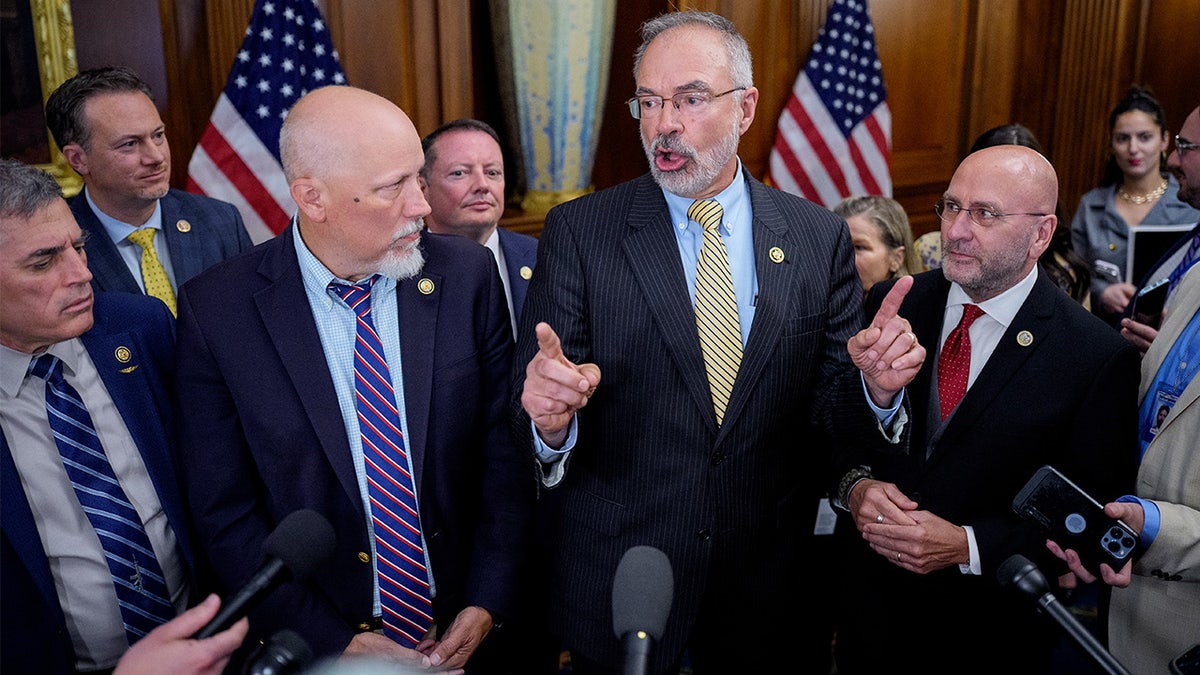
House Freedom Caucus Chair Andy Harris led his group in calling for a delay on the vote. (Getty Images)
«The leadership’s going to have to figure out where to go from here,» Harris said. «I think there is a pathway forward that we can see…I’m not sure this can be done this week. I’m pretty confident it could be done in 10 days. But that’s up to leadership to decide.»
Harris also said the Freedom Caucus had struck a «deal» with the White House, something a White House official denied. «The White House presented HFC with policy options that the administration can live with, provided they can get the votes,» the official said.
However, the manager’s amendment, which finally came out just after 11 p.m. on May 21, eased the concerns of at least several of the fiscal hawks.
It bolstered funding to states that did not expand Medicaid under the Affordable Care Act (ACA), included additional tax relief for gun owners, and quickened the implementation of Medicaid work requirements, among other measures.
Meanwhile, a small group of those House Freedom Caucus members had also been meeting with a small group of conservative senators who assured them they would seek deep spending cuts in the bill when it landed in the upper chamber, Norman said.
MIKE JOHNSON, DONALD TRUMP GET ‘BIG, ‘BEAUTIFUL’ WIN AS BUDGET PASSES HOUSE
«It was our hope that the Senate would come back and even make the cuts deeper, so that the deficit could be cut,» Norman said.
The moves were not enough to ease everyone’s concerns, however. Roughly three hours after the amendment’s release, Freedom Caucus Policy Chair Chip Roy, R-Texas, was the only Republican member of the House Rules Committee to miss the key vote.
Fox News Digital inquired via text message why Roy missed the vote and was told he was «actually reading the bill…»
Nevertheless, it passed by an 8 to 4 vote — prompting House leaders to warn their members to return for what would be an all-night series of voting and debates. Democratic leaders, recognizing they would be sidelined completely if Republicans had enough support on their side, again moved to delay the proceedings.
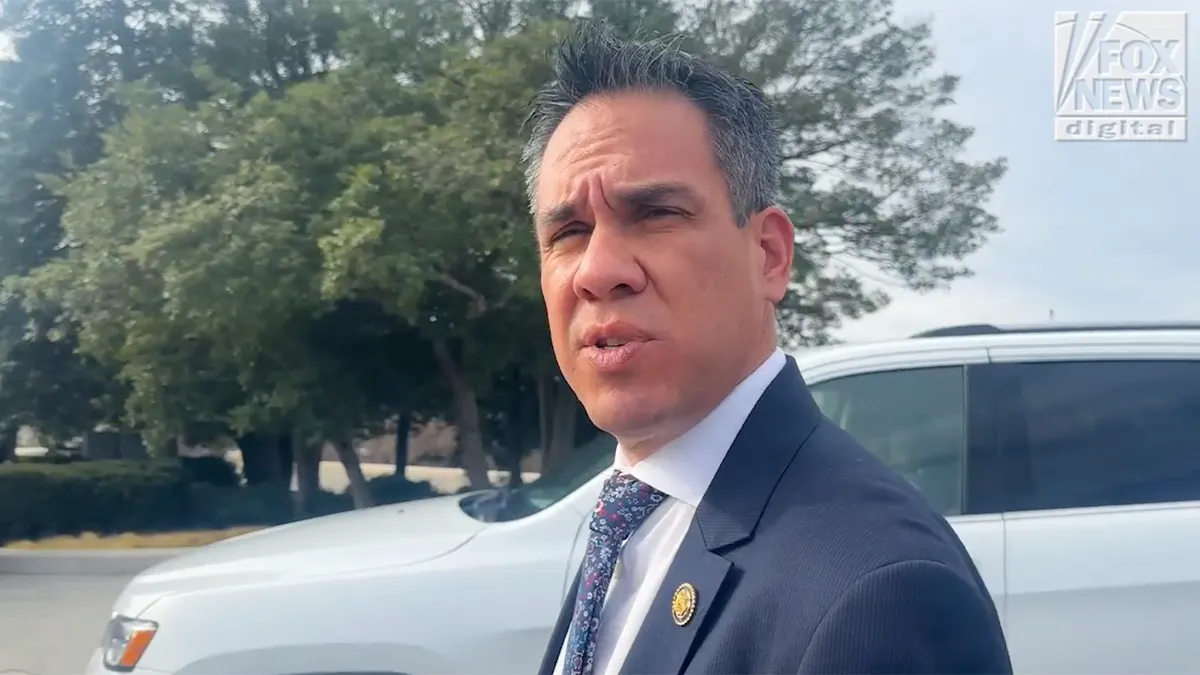
House Democratic Caucus Chair Pete Aguilar called a procedural vote to delay the measure. (Fox News Digital)
A whip notice sent to House Democrats, obtained by Fox News Digital, warned left-wing lawmakers that «House Republicans are planning to finish debate and vote on final passage of H.R. 1 late tonight.»
The notice advised that House Democratic Caucus Chair Pete Aguilar, D-Calif., would force a vote on adjourning the House and that «additional procedural votes are expected.»
In a bid to keep Republicans close to the House floor for what was an hourslong night, the speaker set up a side room with snacks and coffee for lawmakers to wait out proceedings. In the House Appropriations Committee room just down the hall, more Republicans were huddled over cigars and other refreshments. The smell of tobacco smoke wafted out as increasingly haggard lawmakers shuffled between the two rooms.
Fox News Digital even heard from several lawmakers inquiring when the final vote was expected to be — and wondering whether they had time for a nap themselves. Meanwhile, Fox News Digital spotted Harris and Roy walking the opposite way from the hullabaloo of the House floor, toward the much quieter Longworth House Office Building.
Both said they were leaving for more conversations with White House staff before the final vote.
SCOOP: HOUSE GOP MEMO HIGHLIGHTS REPUBLICAN WINS IN TRUMP’S ‘BIG, BEAUTIFUL BILL’
«The manager’s amendment gets us a little closer, but we’re still in discussions with the executive branch to see whether we can achieve the objectives that we seek, which is support the president’s goals on waste fraud and abuse in Medicare and Medicaid and, you know, making sure that we’ve got all we can out of the Inflation Reduction Act,» Harris said.
Roy said he hoped Republicans would go further against states that drastically expanded their Medicaid populations under the ACA. He also signaled that leaders suggested at the time some further Medicaid reform could come from the White House.
«The speaker alluded to this afternoon…that there are things in the executive space, executive actions, that we think could take care of some of the concerns that we were having about — again, it’s not what we want, but it does ameliorate some of our concerns on the Medicaid expansion front,» Roy said.
Fox News Digital reached out to the White House and the speaker’s office for comment.
When it came time for the final vote, it appeared enough was done to get Roy on board. Harris, however, voted «present.»
Neither made themselves available for an interview for this story.

House Speaker Mike Johnson and House Republicans celebrated passing President Donald Trump’s «big, beautiful bill.» (Getty Images)
The final vote saw just two Republican defections — Rep. Thomas Massie, R-Ky., long a critic of Johnson, and Rep. Warren Davidson, R-Ohio.
«While I love many things in the bill, promising someone else will cut spending in the future does not cut spending. Deficits do matter and this bill grows them now. The only Congress we can control is the one we’re in. Consequently, I cannot support this big deficit plan. NO,» Davidson posted on X just before the vote began.
Two other Republicans, Reps. David Schweikert, R-Ariz., and Andrew Garbarino, R-N.Y., both fell asleep before the final vote — but both said they would have voted to pass the bill.
In the end, it advanced by a 215-214 vote — with Republicans erupting in cheers when they realized the victory was locked.
CLICK HERE TO GET THE FOX NEWS APP
«The media, the Democrats have consistently dismissed any possibility that House Republicans could get this done. They did not believe that we could succeed in our mission to enact President Trump’s America First agenda. But this is a big one. And once again, they’ve been proven wrong,» Johnson said during a press conference after the vote.
Now, the bill is expected to be considered by the Senate next week — when senators are already signaling they are gearing up to make changes.
«I encourage our Senate colleagues to think of this as a one-team effort as we have, and to modify this as little as possible, because it will make it easier for us to get it over the line ultimately, and finish and get it to the president’s desk by July fourth,» Johnson said.
House Of Representatives,Republicans,Politics
INTERNACIONAL
WATCH: GOP senators divided over whether Epstein documents are a distraction or a needed reckoning
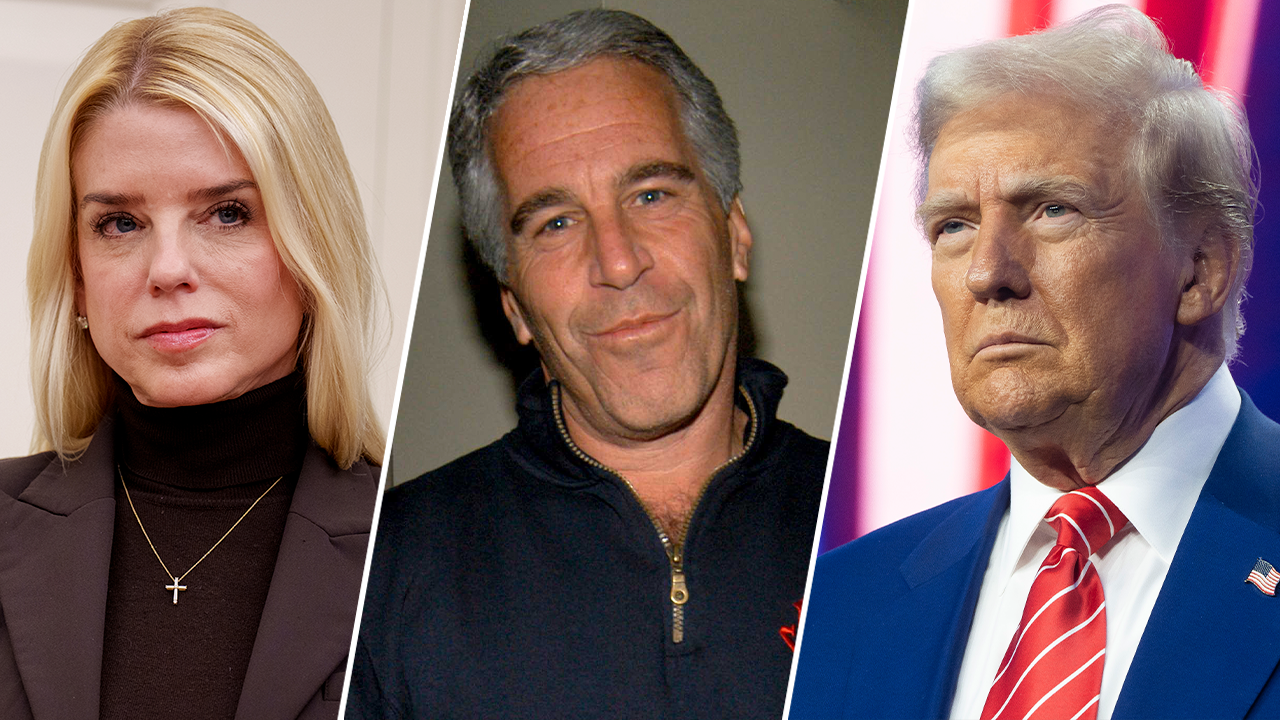
NEWYou can now listen to Fox News articles!
Republican senators offered a range of responses when pressed on how the Trump administration has been handling the Epstein files controversy, with some calling it a distraction and others arguing the American people are «entitled» to answers.
Attorney General Pam Bondi announced the «first phase» of declassified files related to Jeffrey Epstein Feb. 27, noting the move was following through on President Donald Trump’s commitment to «lifting the veil» on Epstein and his co-conspirator’s actions. Bondi also said the same month she was in possession of an Epstein «client list.»
However, the February declassification contained mostly information and files that had already been publicly available, and the Justice Department subsequently indicated that no «client list» exists. Since then, a series of events, including a clash between FBI Deputy Director Dan Bongino and Attorney General Bondi, have led to mounting pressure on the Trump administration to release more files.
‘NOT GOING AWAY’: INSIDE THE EPSTEIN DRAMA THAT’S THROWN HOUSE GOP INTO CHAOS
Trump’s relationship with Epstein has come under more scrutiny after his DOJ under Attorney General Pam Bondi recently said there is no Epstein «client list.» (Getty Images)
«This is factual. Epstein trafficked a lot of young women, some of whom were minors. The American people are entitled to know who — if anyone — he trafficked these young women to, besides himself, and why they weren’t prosecuted,» John Kennedy, R-La., said.
«Now that’s a very simple question that’s at the bottom of all of this. The Department of Justice is going to have to answer that question to the satisfaction of the American people.»
TABLES TURN AS HOUSE GOP BLASTS DEMS FOR SUDDENLY DEMANDING EPSTEIN TRANSPARENCY FROM TRUMP ADMIN
Kennedy’s call for transparency comes after the president described the Epstein situation as a «hoax» while blasting Democrats and other «weaklings» who continue to buy into it.
«Their new SCAM is what we will forever call the Jeffrey Epstein Hoax, and my PAST supporters have bought into this ‘bull—-,’ hook, line, and sinker,» Trump wrote on his Truth Social platform last month amid mounting reports of internal division within the administration over its handling of the Epstein case
When asked about how the Trump administration was handling the Epstein furor, Sen. Markwayne Mullin, R-Okla., said he thought the situation was being used by Democrats to create a «distraction» from the ongoing investigations into former President Biden and others, like the probe related to Biden’s use of an autopen tool to sign important documents and the investigation into whether Obama-era officials manufactured evidence to accuse Trump of Russian collusion.
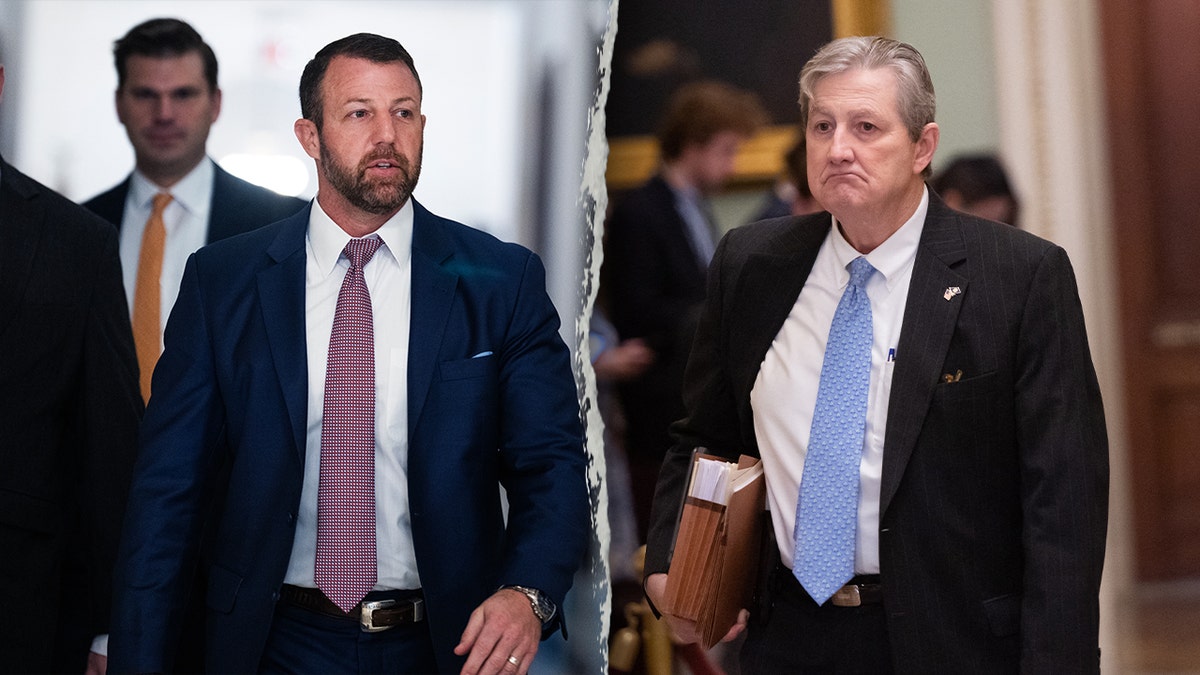
Senators Markwayne Mullin, R-Okla., left, and John Kennedy, R-La., shared their takes on how the Trump administration is handling the Epstein controversy. (Getty Images)
«Look what’s being investigated right now through the Biden administration. … So, what are they going to talk about now?» Mullin asked. «This is nothing but a distraction from the actual facts that is coming out about the Biden administration. Of course, the Democrats say, ‘Well, we’re just about transparency.’ Well, where was the transparency the last four years?»
Democrats have suggested Trump could be implicated in the files, but Mullin said that if such a circumstance were true, the information would have been leaked by the Biden administration.
Mullin’s counterpart in the Senate, Republican Oklahoma Sen. James Lankford took more of a middle ground in his response about how the administration has been handling the Epstein files.
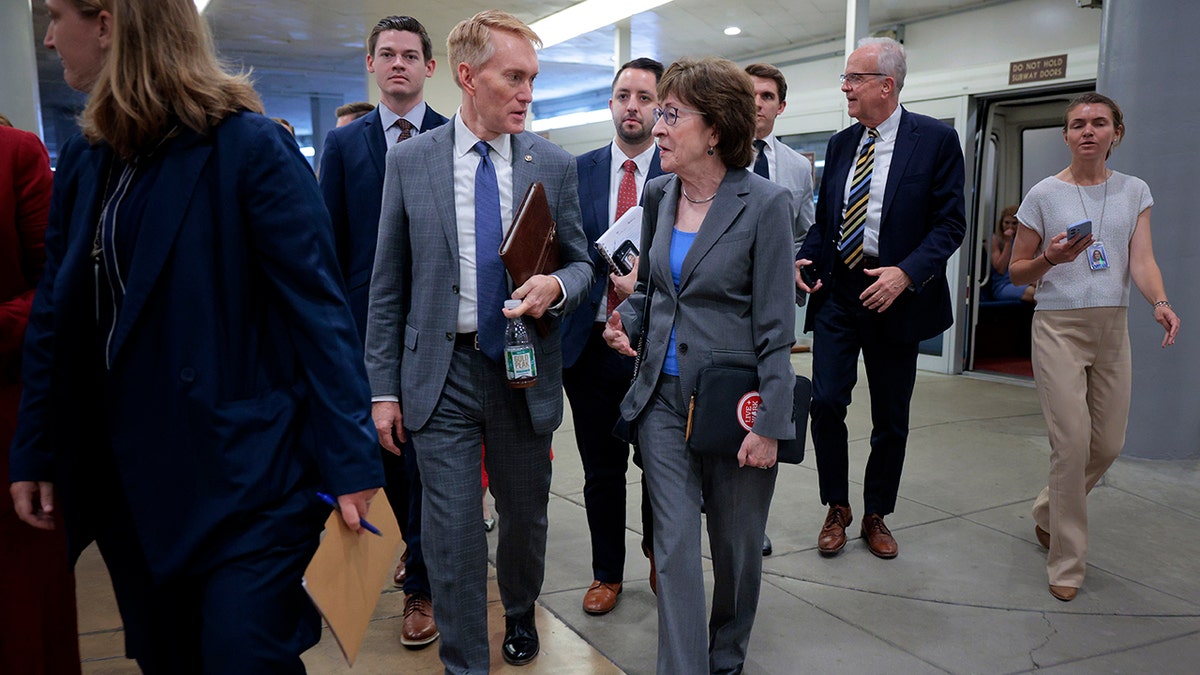
Sen. James Lankford, R-Okla., left, and Sen. Susan Collins, R-Maine, talk as they head to the U.S. Capitol for votes July 31, 2025, in Washington, D.C. (Chip Somodevilla/Getty Images)
CLICK TO GET THE FOX NEWS APP
«The challenge is there are people that are victims that are in it, and there are folks that are not criminals that are in it as well,» Lankford said. «And the challenge the Department of Justice has is you’ve got a girl that was 14, 16 years old and was abused. Well, now she’s, let’s say 26 or 30, married and has children.
«Maybe her family knows about this, maybe they don’t. I don’t know the situation, but we gotta figure out a way to be able to protect those folks that are genuine victims on all this as well as getting out as much information as you possibly can.»
For Sen. Susan Collins, R-Maine, the debate about the Epstein files was not something she was interested in talking about when approached by Fox News Digital.
«I’m going,» Collins responded when pressed on the matter outside the Capitol complex.
jeffrey epstein,republicans,senate,donald trump,ghislaine maxwell,politics
INTERNACIONAL
El líder de la ONU advirtió sobre una “peligrosa escalada” tras la decisión de Israel de tomar la ciudad de Gaza

El secretario general de la Organización de las Naciones Unidas (ONU), António Guterres, expresó este viernes su preocupación tras la decisión de Israel de extender su ofensiva militar en la Franja de Gaza y asumir el control de la ciudad de Gaza, la mayor aglomeración del enclave palestino.
Según un comunicado leído por su portavoz adjunta, Stephanie Tremblay, Guterres considera que esta medida “marca una peligrosa escalada” en el conflicto y pone “aún más en peligro” a los civiles en la región, incluidos los rehenes en manos de terroristas palestinos.
En palabras de Tremblay, Guterres “está profundamente alarmado por la decisión del Gobierno israelí sobre ‘tomar el control de la ciudad de Gaza’”, y advirtió que esto podría “agravar las ya catastróficas consecuencias de millones de palestinos”.
El secretario general subrayó que los palestinos en Gaza “siguen padeciendo una catástrofe humanitaria de proporciones terroríficas”, al tiempo que señaló que una nueva ofensiva podría “provocar un nuevo desplazamiento forzado, muertes y destrucción masiva, suponiendo un sufrimiento inimaginable a la población palestina”.
El conflicto en la Franja de Gaza se acerca a los dos años y, según declaraciones oficiales, la decisión del gabinete de seguridad del primer ministro israelí, Benjamin Netanyahu, añade tensión a la ya inestable situación.

El Consejo de Seguridad de la ONU anunció la convocatoria de una reunión de urgencia para este sábado, con el objetivo de abordar el nuevo plan israelí tras solicitudes de varios miembros, según informaron fuentes diplomáticas a la AFP. “Varios países en nuestro nombre y en el suyo propio están solicitando una reunión del Consejo de Seguridad”, declaró este viernes el representante palestino ante la ONU, Ryad Mansour.
Guterres reiteró su llamado a un alto el fuego y a facilitar la entrada de ayuda humanitaria, exhortando a las autoridades israelíes a cumplir con sus obligaciones conforme al Derecho Humanitario Internacional. “No habrá una solución sostenible a este conflicto sin el fin de la ocupación ilegal y una solución viable de dos Estados. Gaza es y debe seguir siendo parte integral de un Estado palestino”, afirmó el secretario general.
Adicionalmente, Guterres recordó que la Corte Internacional de Justicia (CIJ) exige a Israel “poner fin a su presencia ilegal en los territorios palestinos ocupados –que abarca Gaza y Cisjordania, incluida Jerusalén Este– lo antes posible”.
En el ámbito humanitario, Tremblay confirmó el encuentro celebrado el miércoles entre personal de la ONU y representantes de la Fundación Humanitaria de Gaza (GHF, por sus siglas en inglés), entidad respaldada por Israel y Estados Unidos desde mayo para la distribución de alimentos en la zona. La portavoz explicó que la reunión, impulsada por la Misión de EEUU ante la ONU, abordó “la grave situación humanitaria en Gaza”.
“Con prácticamente toda la población de Gaza al borde de la hambruna, damos la bienvenida a cualquiera que eleve su voz para llegar urgentemente con asistencia humanitaria a los civiles de Gaza. Pero ya tenemos un plan basado en principios humanitarios reconocidos globalmente”, explicó Tremblay.
Según el Ministerio de Sanidad palestino, cientos de personas han muerto por disparos del Ejército israelí o a consecuencia de disturbios cuando buscaban ayuda en los centros de la GHF, ubicados en áreas bajo control militar israelí. Una reciente investigación de Médicos Sin Fronteras (MSF) sostiene que estos centros ‘son lugares de asesinatos orquestados y deshumanización’ y pide su cierre. Además, un grupo de 25 relatores y expertos de la ONU solicitó esta semana el desmantelamiento de la GHF, creada por Israel en febrero de 2025 con apoyo de EEUU.
La ONU mantiene que su “plan funciona” y ofrece puntos de distribución en todo el territorio, donde las personas pueden recibir asistencia humanitaria de manera segura. Preguntada por los principios que rigen el trabajo de la GHF, Tremblay respondió: “Creo que puedes ver lo que está pasando en Gaza día a día”.
El aumento de la ofensiva y el control de Israel sobre la ciudad de Gaza han avivado la preocupación internacional. Con el Consejo de Seguridad preparado para abordar la situación, la comunidad internacional aguarda las próximas decisiones respecto al futuro del enclave y la respuesta humanitaria en la región.
(Con información de AFP, EFE y EP)
INTERNACIONAL
En busca de espías, Irán ejecuta a un científico nuclear

 POLITICA3 días ago
POLITICA3 días agoCausa Cuadernos: la Justicia confirmó el inicio del juicio en contra de Cristina Kirchner por corrupción

 DEPORTE2 días ago
DEPORTE2 días agoRakitic, obligado a pedir disculpas tras felicitar a Modric por su fichaje

 POLITICA2 días ago
POLITICA2 días agoLa oposición logró la media sanción para el aumento del financiamiento universitario y desafía a Milei


































